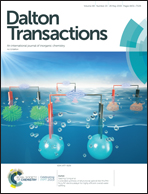Rationale for the reactivity differences between main group and d0 transition metal complexes toward olefin polymerisation†
Abstract
In contrast to early transition metal complexes of d0 electron configuration, their main group metal analogues are usually poor catalysts for ethylene polymerisation due to their diminished tendency to insert ethylene into an M–R bond. Interestingly, we found that ring strain in the transition structure of the insertion reaction is most likely responsible to set the ease of the process. Ethylene insertion into an M–R bond requires a four-membered ring transition structure. Strain in a four-membered ring was shown to be dependent on the metal identity (transition or main group/d or p block). For early transition metals, due to the presence of empty valence d orbitals, the strain is negligible but, for main group metals, the strain is significant and so destabilizes the corresponding transition structure. Our claim gains support from investigation of ethylene insertion into an M–allyl bond. In this case, the relevant insertion preferentially passes through a six-membered ring transition structure with an accessibly low activation barrier. In contrast to four-membered ring transition structures, six-membered ones do not suffer significantly from ring strain, causing the insertion activation barrier to become independent of the metal identity. It becomes obvious from our study that this previously undisclosed factor should play the pivotal role in determining the reactivity of many catalysts.



 Please wait while we load your content...
Please wait while we load your content...